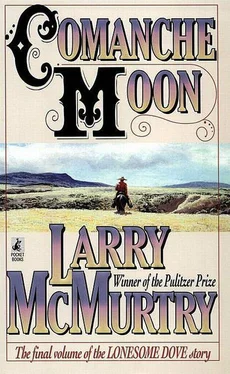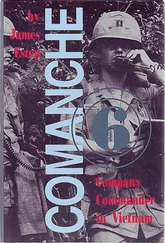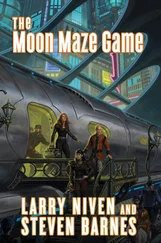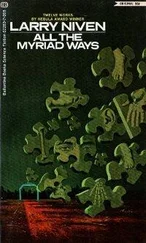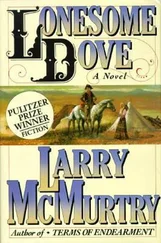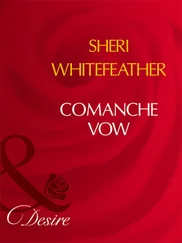He had not yet called a council of the braves, because, every night, his vision grew stronger.
In his vision he saw a thousand warriors riding together, in war paint, wearing all the finery they could assemble, sweeping down on the white towns, singing their war songs, killing whites, and burning settlements all the way to the Great Water.
Slipping Weasel was disappointed by Buffalo Hump's casual response to his news. The whole camp was excited about it, but Buffalo Hump was barely moved to comment. Of course, Buffalo Hump and Kicking Wolf were old rivals, and often quarrelled. Maybe Buffalo Hump was glad that Kicking Wolf had left.
"You could go catch Scull," Slipping Weasel suggested. "He is walking not far from the Pecos. You could catch him in a few days." "Am I a rabbit hunter?" Buffalo Hump said. "Scull is just a rabbit. Let him hop down to Mexico. The Black Vaquero will catch him and make a tree grow through him." He was referring to a strange torture that the Black Vaquero sometimes inflicted on his enemies, if he caught them alive. He would trim the leaves and limbs off a small, slim tree and then sharpen the boll to a fine point. Then he would strip his enemy and lift him up and lower him onto the sharp point of the skinned tree. The man's weight would carry him downward, so that the tree went higher and higher into his body.
Ahumado was an expert at the torture. He would spend an hour or more sitting a man on the sharp tree, so that as the tree passed through his body it would not pierce any vital organs and allow the man to die too easily.
Sometimes the slim trees would pass all the way through the captive's body and poke out behind his body, and yet he would still be living and suffering.
Once Slipping Weasel and Buffalo Hump and a few warriors had come upon a little forest of such trees, with men stuck on them like rotting fruit.
There were more than ten in all, and two of the men were still alive, panting hoarsely and crying for water. It had been a startling sight, the little forest of trees with men hanging on them like fruit. The Comanches had lingered by the forest of tree-stuck men for half a day, studying the dead men and the living. The living men were in such agony that even the slightest touch made them scream with pain. Buffalo Hump and the other Comanches were surprised by the sight. They did not often see tortures that were worse than their own-- all the way back to the plains they talked about the torture of the little trees. On the way home they surprised a few Texans driving a horse herd west. They wanted to catch one of the Texans and stick him on a little tree, to learn the technique, but the Texans fought so fiercely that they had to kill them all and did not get to practice the little-tree torture. Those who had seen the forest of dead and dying men did not forget it, though--none of them, after that, were eager to go into Ahumado's country.
Slipping Weasel finally got up and left Buffalo Hump alone, since the chief seemed to be in a bad mood and had little to say. More and more Buffalo Hump spent his days with his young wife, Lark. Once when they were engaged with one another they forgot themselves to such an extent that they rolled out from under their tent and coupled, for a brief time in full view of some old women who were scraping a buffalo hide. The old women were agitated by the sight; they tittered about it for days. Buffalo Hump's other wives did not appreciate the tittering. A day or two later they found an excuse to beat Lark, and they beat her soundly.
Slipping Weasel thought he could find a few warriors who would want to go catch Big Horse Scull; but when he tried to talk some warriors into going they all made excuses and put him off.
The reason was Buffalo Hump. Everyone knew that the chief was planning something. They saw him leave the camp night after night, to climb a rock far up the canyon, where he prayed and sang. Except for Lark he paid little attention to anyone--he only wanted to copulate with Lark or sit on his rock praying--everyone knew that he was seeking visions. Old Slow Tree had finally left the camp in annoyance because Buffalo Hump was so uninterested in his notions of how to get along with the whites.
What the warriors thought was that Buffalo Hump would soon find his vision and call them all to war.
Earlier, they would have been glad to track down Big Horse Scull and take revenge on him, but now they were afraid to leave, for fear that they would not be there when Buffalo Hump called them to the war trail. Old Slow Tree's warriors did not much want to go away with him; they didn't share his peaceful views and were eager to fight the whites again.
Though it annoyed him, Slipping Weasel had to abandon his plan for catching Big Horse Scull. He waited, as the others waited, doing a little hunting, but mainly looking to his weapons.
He and the other warriors spent many days making arrows, sharpening their points, smoothing their stems.
They rewrapped the heads of their lances and made sure their buffalo-skin shields were taut.
Then one day Buffalo Hump finished boiling the great skull he had brought back from the Blue River. All day he worked to make the hard part into a small heavy shield, much heavier than the skin shields the other warriors carried. At dusk, when he finished the shield, he went out to the horse herd and brought back the strong white gelding he rode when he went raiding. That night he kept the horse tethered behind his tent. It was late in the night when he came out of his tent and walked back up the canyon to the high rock.
He wore nothing that night but a loincloth, and he carried his bow and his new shield.
All night they heard Buffalo Hump praying. Once the sun edged into the sky, and light came to the canyon, Buffalo Hump was still sitting on the high rock, with his bow and his thick shield. When he walked back into camp, with the sun well up, there was a hush in the camp. The women didn't talk of copulating as they worked at the cooking pots, as was common in the morning.
The hush silenced the children; they didn't run and play. The dogs ceased barking. Everyone knew that Buffalo Hump had found his vision.
When he sat down in front of his tent and began to paint himself for war there was joy throughout the camp.
Within a few minutes he sent runners to call the warriors from the other bands. Solemnly but gladly all the warriors began to do as their chief was doing. They began to put on war paint. No one asked Buffalo Hump what he was planning; no one needed to. There would be a great raid on the whites--Comanche warriors would be proud men again. The endless talk about whether to grow corn was over. Their greatest chief had found a vision, and it was not a vision of peace.
By afternoon, warriors from the nearby bands began to ride in, painted and ready. There was much selecting of horses and packing of stores. The women worked hard, but their voices were hushed. They did not want to be joking when their men were going on a raid that might mean glory or might mean death.
Finally one old warrior, old Crooked Hock, known for his great curiosity but not for his good judgment, had the temerity to ask Buffalo Hump how far he planned to raid.
Buffalo Hump did not look at the old man. He wanted to concentrate on his vision of burning houses. Anyway, he did not know how far he planned to raid--he would raid until it was time to quit. But, as he was about to answer the old man brusquely, he saw in his mind another vision, this one of the sea. The Great Water rolled toward the land and spat from its depths the bodies of whites. The vision of the sea with the white bodies bobbing in it was so powerful that Buffalo Hump realized he ought to be grateful to Crooked Hock for asking the question that had enabled him to see the final part of his vision--the vision of rolling waves spitting white bodies onto beaches of sand. The vision was so strong that Buffalo Hump stood up and yelled at the warriors loudly, his voice echoing off the canyon.
Читать дальше
